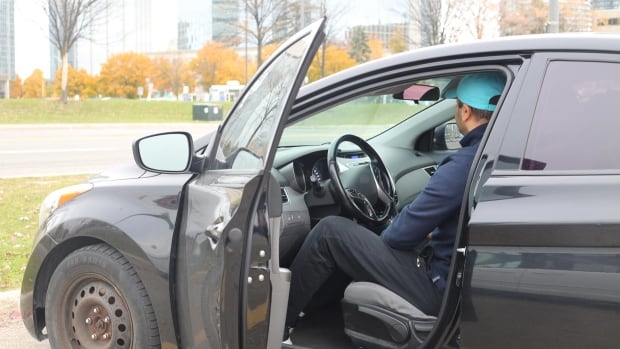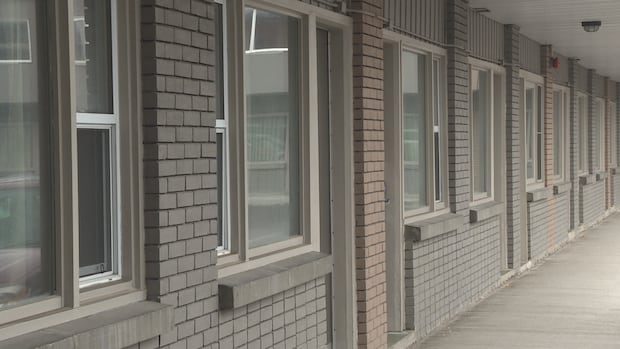One look inside the car and it’s obvious someone has been living in it.
There are shirts on hangers dangling from the passenger-side window hook. In the back seat, there’s a blanket, a pillow and an eye mask.
The vehicle has been home to an asylum seeker since his recent eviction from a hotel leased by the federal government. CBC News is not naming the man because he’s afraid he will be sent back to his country, where he fears for his safety, as he’s still waiting for a hearing on his refugee claim in Canada.
“It’s very difficult. It’s very cold at night,” he said. “Sometimes, I don’t have a place to go to the washroom, to change my clothes.”
Immigration, Refugees and Citizenship Canada (IRCC) has rules for asylum seekers in its hotels across the country that, if broken, could result in occupants receiving short-term eviction notices that leave them with little choice but to sleep on the streets or, in this case, in their car in the midst of a nationwide housing crisis.
The reception of asylum seekers is an issue for many countries, including Canada, as they grapple with ongoing irregular migration patterns and polarized public opinion.
Ottawa recently announced a roughly 20 per cent reduction in the number of permanent residents in 2025 — from a previous target of 500,000 to 395,000 — amid recent polls showing Canadians have an increasingly negative attitude toward immigration.
Given 3 days to leave for alleged violations
Two and a half years ago, the man arrived in Canada from North Africa through Roxham Road — a rural road that became an unofficial border crossing between Quebec and the United States for thousands of asylum seekers — and was living in one of the hotels in the Greater Toronto Area. But following a dispute with his roommate, he was recently given an eviction notice stating he had three days to leave.
“I [cannot] imagine this,” he said. “We are in Canada,” he said.
CBC News has viewed the document, which cited the reasons for the eviction as “failure to meet with IRCC representative” and “aggressive” behaviour.

The asylum seeker said he did miss a meeting because he mixed up the time but denies he was ever aggressive with his roommate or IRCC employees.
“It’s not fair,” he said. “I don’t make any problem. I don’t know why [they] say I am aggressive.”
He told CBC News the immigration officer insisted the reason for his eviction was due to the meeting and not the issue with the roommate. In the final eviction meeting, he said he was told that he could live in his car.
In a statement to CBC News, IRCC said it couldn’t discuss specific cases due to privacy issues. But it said eviction notices for aggressive behaviour can be given “with very short duration due to safety concerns” and that eviction notices related to aggressive behaviour are “infrequent.”
An asylum seeker living in the GTA says he’s now sleeping in his car because of an eviction policy in federally run hotels. Ottawa has rules in place for asylum seekers living there — and if they’re broken, it can mean as little as three days’ notice to move out. CBC’s Lisa Xing spoke with the man, who says he was treated unfairly.
In an interview, the man’s roommate confirmed they had a dispute but said the man was never physically aggressive. They are still communicating. The roommate also confirmed that he received an eviction notice giving him three days to move out. He said he spent several weeks sleeping in bus shelters before someone in his community took him in.
“In these cases, for the safety and security of others and staff, individuals are given short notice, which can vary based on the specific risk and situation, but is generally less than one week,” an IRCC spokesperson told CBC News.
Some violations lead to an initial warning, and the penalty could then escalate to an eviction. There isn’t a standardized process or an appeal process.
Under the IRCC’s terms, asylum seekers in hotels can be evicted for various reasons, from breaking an 11 p.m. curfew and cooking in the rooms, to aggressive behaviour and missing meetings with immigration officials.
Shelters are at capacity
“It’s a shame,” said Toronto immigration and refugee lawyer Robert Israel Blanshay. “It’s an embarrassment for a G7, G20 country — one of the wealthiest countries in the world — to still grapple with the settlement needs of asylum seekers.”
Blanshay and other advocates said the short notice is exacerbated by the housing crisis in Canada, where hotels are far from an ideal place to house newcomers.
“There’s got to be a better solution for housing refugees. It’s a shame … that anybody lives on the streets, including asylum seekers.”

There were 7,800 refugee claimants — including about 5,100 in Ontario and 2,500 in Quebec — housed in about 34 hotels across six provinces as of Feb. 26, according to the IRCC.
The issue of asylum seekers sleeping in the streets has been an ongoing problem in recent years as shelters run at capacity, sometimes resulting in deaths.
Within the past year, two asylum seekers without shelter have died in Mississauga, Ont. One man, from Nigeria, was found dead inside a tent in November 2023. A woman, Delphina Ngigi of Kenya, died in February after waiting for hours outside for a shelter space and spending the night on the floor in the shelter lobby.
Greg Cook, a longtime outreach worker in Toronto who’s on the steering committee of the Shelter and Housing Justice Network, said the IRCC rules for claimants living in hotels are “demeaning.”
“Treating people like they’re not an adult,” he said, pointing out they aren’t covered under the same legislation that protects tenants.
“As a tenant, I have rights. This person obviously did not have the same rights, and this person should have the same rights.”
‘A patchwork of policies’
Syed Hussan, executive director of the Migrant Workers Alliance for Change, said all levels of government are responsible for housing asylum seekers.
“What we have is a patchwork of policies where people who are not qualified, are not covered in the basic landlord-tenant protections, [are] trying to deal with housing issues. It makes no sense,” he said.
Hussan said an advocate should have been available to help the man once the eviction occurred, like his group has done in the past.
“I have seen this. I’ve heard of it,” he said. “This person needed an advocate to be able to work with them, to get in touch, to figure out solutions.”
Because the asylum seeker didn’t have that support, he continues to spend his nights in parking lots — though not for much longer. Thanks to a member of his community, he’s found a place to live.
Even so, he vows his family back home will never find out about his time on the street: “I can’t say that to my mom or father or my wife, my children. No. It will make them very sad.”



